|
|
|
Sort Order |
|
|
|
Items / Page
|
|
|
|
|
|
|
| Srl | Item |
| 1 |
ID:
153622
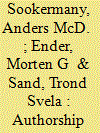

|
|
|
|
|
| Summary/Abstract |
Armed Forces & Society (AF&S) was founded in 1974 with the overall intention of creating an international arena for interdisciplinary approaches to the study of the military institution and the intersection of armed forces and their society. The present study is both a follow-up and an update of Morten Enders’s article “Authorship and Affiliation in Armed Forces & Society” covering 1,139 articles in the 41 volumes published from 1974 until 2015. The scope has been to look for the evolving trends on Authorship and Affiliation (A&A) within AF&S so as to say something about what AF&S has become over these years, as a consequence of whom the authors are and where they come from. Our findings suggest a developmental narrative of A&A in AF&S of a continuously higher author–article ratio, an increased female authorship ratio, and a wider range of disciplines from more continents, countries, and institutions, plus a trend of increased cross-national coauthorship.
|
|
|
|
|
|
|
|
|
|
|
|
|
|
|
|
| 2 |
ID:
109950
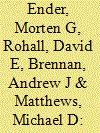

|
|
|
|
|
| Publication |
2012.
|
| Summary/Abstract |
The authors investigate a gap in attitudes toward homosexuals in the U.S. military among a select group of people-American civilian undergraduates, Reserve Officer Training Corp (ROTC) cadets, and cadets at military academies. Using a subsample (N = 3057) of data from the Biannual Attitude Survey of Students (BASS), being a military academy cadet is associated with the strongest agreement for barring homosexuals from serving in the military, followed by ROTC cadets and civilians. These trends continue when controlling for respondents' sex and political affiliation-the two most significant predictors of agreeing to bar homosexuals from military service. A small reduction in agreement for barring was found among academy cadets over time.
|
|
|
|
|
|
|
|
|
|
|
|
|
|
|
|
| 3 |
ID:
124059
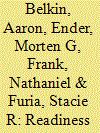

|
|
|
|
|
| Publication |
2013.
|
| Summary/Abstract |
Prior to the repeal of "don't ask, don't tell" (DADT) on September 20, 2011, many observers predicted that allowing lesbian, gay and bisexual troops to serve openly would harm the military, and a group of more than 1,000 retired general and flag officers predicted that repeal could "break the All-Volunteer Force." This study is the first scholarly effort to assess the accuracy of such predictions about the impact of DADT repeal on military readiness. We conducted our research during the half-year period starting six months after repeal and concluding at the one year mark, and we pursued ten separate research strategies including in-depth interviews, survey analysis, on-site field observations, pretest/posttest quasi experimentation, secondary source analysis, and a comprehensive review of media articles. Our goal was to maximize the likelihood of identifying evidence of damage caused by repeal, and we made vigorous efforts to collect data from repeal opponents including anti-repeal generals and admirals, activists, academic experts, service members and watchdog organizations. Our conclusion, based on all of the evidence available to us, is that DADT repeal has had no overall negative impact on military readiness or its component dimensions, including cohesion, recruitment, retention, assaults, harassment, or morale. If anything, DADT repeal appears to have enhanced the military's ability to pursue its mission.
|
|
|
|
|
|
|
|
|
|
|
|
|
|
|
|
| 4 |
ID:
108740
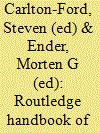

|
|
|
|
|
| Publication |
London, Routledge, 2011.
|
| Description |
xxiii, 323p.
|
| Standard Number |
9780415567329, hbk
|
|
|
|
|
|
|
|
|
|
|
|
Copies: C:1/I:0,R:1,Q:0
Circulation
| Accession# | Call# | Current Location | Status | Policy | Location |
| 056378 | 956.704431/CAR 056378 | Main | On Shelf | Reference books | |
|
|
|
|
| 5 |
ID:
083734
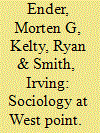

|
|
|
|
|
| Publication |
2008.
|
| Summary/Abstract |
Sociology and the Sociology Program at the United States Military Academy at West Point, New York, are described. Grounded in the academy's mission of educating and inspiring future leaders of character, this article focuses on the history of the Sociology Program, alignment with American Sociological Association standards, sociodemographics of cadet sociology majors, recent graduates, the curriculum, extracurricular activities, and the sociology faculty and their productivity. The Sociology Program has made significant progress in multiple areas while concomitantly being handicapped in other areas. The conclusion addresses the significance of social science in military officer education
|
|
|
|
|
|
|
|
|
|
|
|
|
|
|
|
| 6 |
ID:
083731
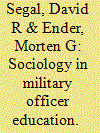

|
|
|
|
|
| Publication |
2008.
|
| Summary/Abstract |
This essay introduces a special issue of Armed Forces & Society examining sociology at military academies around the globe. Articles represent nine countries-Canada, France, Japan, the Netherlands, Russia, South Africa, Sweden, Turkey, the United States. We begin with a brief history of sociology and the military and growth of military sociology as a subfield, followed by the development of military academies in general and sociology at military academies more specifically. The essay concludes with six trends found across the nine nations and ten academies-the stigma of sociology; the cannibalization of sociology courses; co-optation of sociological concepts; charismatic leadership; radical social change; and revitalization.
|
|
|
|
|
|
|
|
|
|
|
|
|
|
|
|
|
|
|
|
|